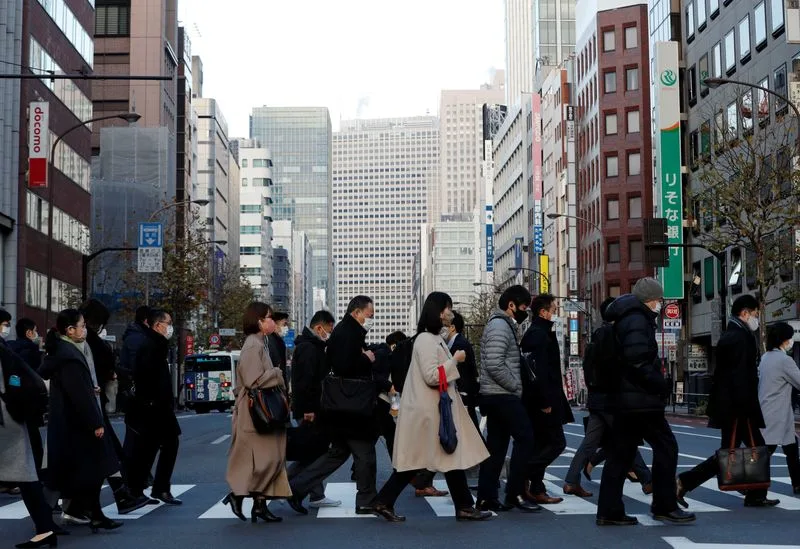
(Reuters) – Japan’s economy is expected to have slowed markedly in the third quarter as global recession risks hurt external demand while rising inflation and a weak yen’s impact on imported prices forced consumers to keep their wallets shut.
Gross domestic product (GDP) data due 0850 local time Nov. 15 (2350 GMT Nov. 14) will likely show the world’s No. 3 economy grew at an annualised rate of 1.1% in July-Septerber, sharply slower from the 3.5% expansion in the second quarter.
That would translate into quarter-on-quarter growth of 0.3%, according to a Reuters poll of 18 economists, also slacking off from the 0.9% pace in April-June.
The significant slowdown in part highlights the harsh impact on Japan from the yen’s slide to 32-year lows against the dollar, which has exacerbated the cost-of-living strains by further lifting the price of everything from fuel to food items.
Prime Minister Fumio Kishida’s government is stepping up support for households to try to ease the effects of cost-push inflation, with a 29 trillion yen ($196.09 billion) in extra spending in the budget.
“Unlike Western countries, Japan has not experienced pent-up demand while service consumption at hotels and restaurants remains stagnant,” despite easing coronavirus curbs, said Takeshi Minami, chief economist at Norinchukin Research Institute.
“Supply-side restrictions have also curbed car output,” he said, adding that “depending on the extent of slowdown in the global economy, Japan could follow suit and you cannot rule out the possibility that it slides into recession next year.”
Capital expenditure probably underpinned third quarter growth, is forecast to have risen 2.1% in July-September, versus 2% increase in the previous quarter, reflecting improved performance at big exporters and others thanks to the earnings boost from a weak yen.
External demand, or net exports — shipments minus imports — likely shaved 0.2 percentage points off GDP, after having added 0.1 percentage point to the second-quarter gain.
Private consumption that accounts for more than half the economy, is expected to have slowed to a crawl in the third quarter with an increase of 0.2% from a 1.2% gain.
Separate data by the internal affairs ministry is also set to underline the broad pressure across the economy, with the pace of growth in household spending seen almost halving to 2.7% year-on-year in September from 5.1% gain in August.
The strains on business showed no signs of easing either with input costs up sharply. Japan’s corporate goods price index, a barometer of wholesale prices that companies charge each other, is forecast up 8.8% year-on-year in October, easing from the previous month of 9.7%.
Household spending data will be released 0830 JST Nov. 8/ 2330 GMT Nov. 7 and corporate goods price index is due 0850 JST Nov. 11/ 2350 GMT Nov. 10.
Ministry of Finance (MOF) data, due out 0850 JST Nov. 9/ 2350 GMT Nov. 8 will likely show current account came to 234.5 billion yen ($1.58 billion) in September.
($1 = 147.8900 yen)
Paris Saint-Germain star Achraf Hakimi has spoken out following his defeat by Ademola Lookman for…
Ukrainian boxer Oleksandr Usyk reinforced his position as one of the greatest heavyweight champions in…
The National Emergency Management Agency (NEMA) has said it has put all its zonal, territorial…
Erhiatake Ibori-Suenu, member representing Ethiope Federal Constituency of Delta State in the House of Representatives…
The Economic and Financial Crimes Commission (EFCC) has reportedly secured a final forfeiture order for…
An unverified number of residents are feared to have died after a stampede occurred in…